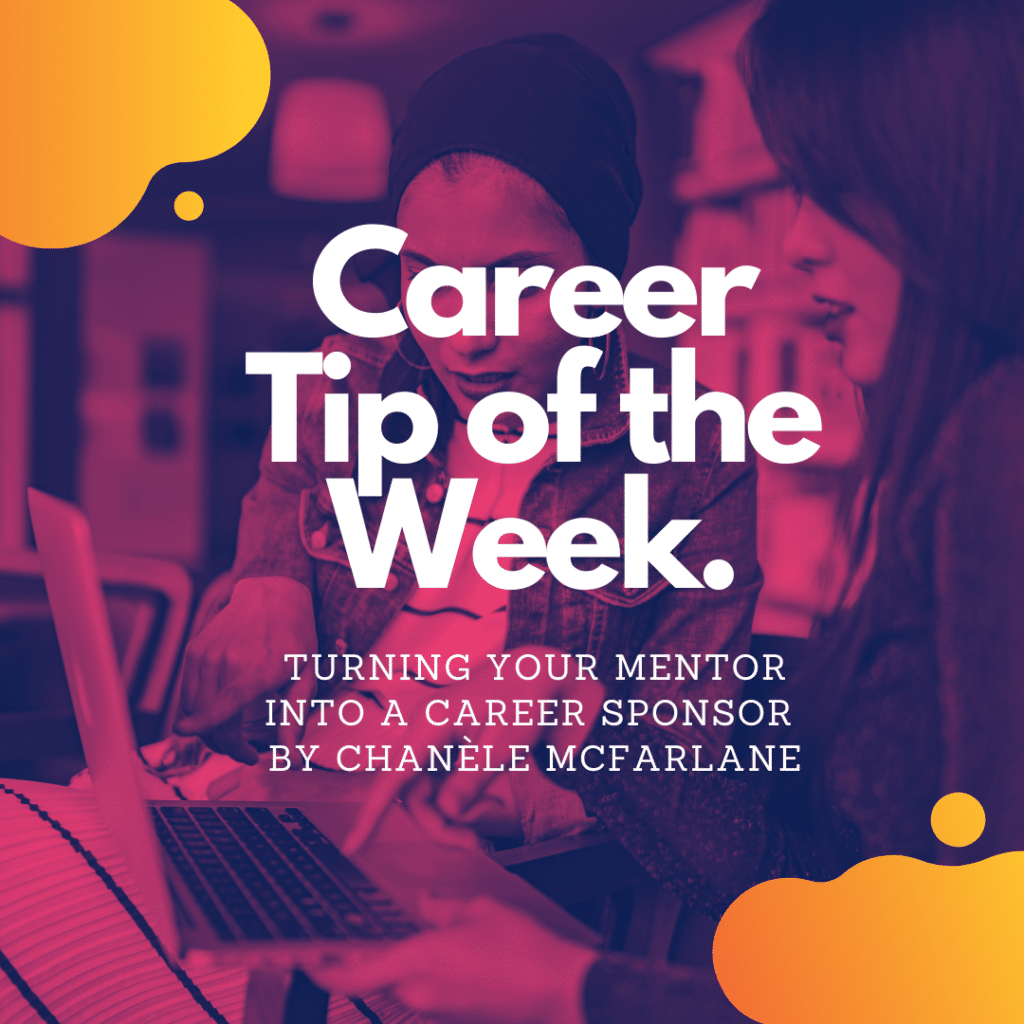By: Chanèle McFarlane
I’ll never forget my first experience with a career sponsor.
I was a few months away from completing my postgraduate certificate in Public Relations and I was starting to interview for my first real job. I managed to land an interview at a major agency in downtown Toronto and I was ecstatic…but also very nervous!
After several interviews, I got the words that no one likes to hear: “We’ve decided to move forward with other candidates.” Just great, I thought.
But, then something else happened. The hiring manager reached out to me again and offered to connect me to her network. She felt that I had a lot of potential and although this particular opportunity didn’t work out, she was impressed with my experience and wanted to send my resume out to a few folks she knew.
I didn’t know it then (I thought she was just being nice!) but this was my first experience with a sponsor, who I’ve since come to learn is a key person everyone needs in their professional network. This person, who was a White woman, was willing to go out of her way to leverage her social capital for my benefit. This early-career experience was huge for me as a young Black woman and as I reflect back now, it gave me a much-needed confidence boost for the rest of my job search ahead and yes, I did end up landing a gig a few weeks later!
So, what is sponsorship?
One of the best definitions I’ve seen is from a Harvard Business Review article that describes sponsorship as active support by someone appropriately placed in the organization who has significant influence on decision-making processes or structures and who is advocating for, protecting, and fighting for the career advancement of an individual.
That said, sponsors don’t just exist within the workplace. You could find a sponsor at school, within an organization you volunteer and/or even within your personal and professional network. The key thing to note is that
sponsors leverage their own power and reputational capital. Sponsorship is high stakes because the sponsor is putting their reputation on the line.
In a compelling
Forbes article penned by a Black woman senior executive, some great key actions that sponsors can take are outlined, including:
- Using your network to make warm introductions
- Nominating women of colour for industry awards
- Serving as advocate for the next executive role to come from a diverse pipeline
- Celebrating the achievements of women of colour, especially in public
Although being on the receiving end of these actions can be transformational, unfortunately recent studies continue to show that sponsorship, especially for BIWoC, isn’t common. In fact, it’s one of the many things that holds us back from advancing in the workplace. If you think of career advancement as a ladder, sponsorship is one of those key steps, yet for BIWoC, it’s often broken.
So, how can you access the power of sponsorship? Start by getting a great mentor.
Mentorship is a critical stepping stone because it is during this relationship that your mentor (and potential sponsor!) gets to know you and your work ethic. After all, this is why Accelerate Her Future has designed their Fellowship Circle – to give you access to mentorship from business and tech leaders!
Once you have a mentor, you also have the power to cultivate that relationship and organically transition them into a career sponsor. Here are 3 strategies to help you do that:
Outperform and produce exceptional work
There’s no better way to attract a sponsor than with producing exceptional work. If you are consistently achieving great results and demonstrate high potential for even bigger achievements, a sponsor is very likely to want to do whatever they can to help you get there.
Now, I know this may seem a bit daunting especially when you consider the old adage that many of us grow up hearing:
you have to be twice as good to go half as far. Truth is, we often do have to put in more work than our non-POC counterparts but that said, it’s important to know your limits so that you don’t risk burning out. Yes, you want to focus on outperforming whether it’s at school, the workplace or even a job interview but remember to also give yourself grace and know when it’s time to take a break. You’ll always perform at your best when you’re well-rested and have prioritized your mental health.
Regularly share your goals and work
Having your short-term and long-term goals mapped out is important because when you have a potential sponsor, they’ll want to know what they are and of course, what action they can take to help you achieve them. Again, sponsors are putting their name on the line so they will feel more confident doing so when you’re goal-oriented.
Once you know what your goals are, share them with your mentor along with your work! I know, it can feel a bit uncomfortable at first but if there’s anything I’ve learned, it’s not just about who you know but who knows what you know!
Actively look for opportunities to showcase your work and connect with your mentor on social media. I also recommend sending them regular email updates (every quarter is a good cadence!) so that they can keep up with what you’re up to at all times and more importantly, you stay top of mind if they encounter any opportunities you may be a fit for. This action demonstrates that you value their mentorship and you can also share with them how you’re putting their great advice into practice.
Diversify your network
There’s an interesting study that was conducted a few years ago that uncovered a
networking gap between how men and women network. Women tend to seek out people they want to be friends with instead of someone they can learn from. We are very likely to try and find someone who looks like us. Men, on the other hand, are willing to form alliances with anyone as long as the person can help them achieve their goals. When it comes to sponsors, remember that you’re not looking for a friend. You may not exactly like every single thing about them but it’s their reputation, network and honest feedback that you’re looking to leverage.
Personally, I have some incredible sponsors that are women of colour but I’ve also had men, including white men, that have helped to open up opportunities for me. In the Fellowship Circle, you will have access to women of colour mentors and also allies. Your sponsors don’t need to look like you in order to be an asset to your career and we want to ensure that you have access to a diverse network of leaders.
Having a sponsor can truly mean the difference between staying stagnant and continually advancing your career. Mentorship can be a great pathway into sponsorship helping you achieve your career goals. Remember, all it takes is one person to completely accelerate the trajectory of your career.



